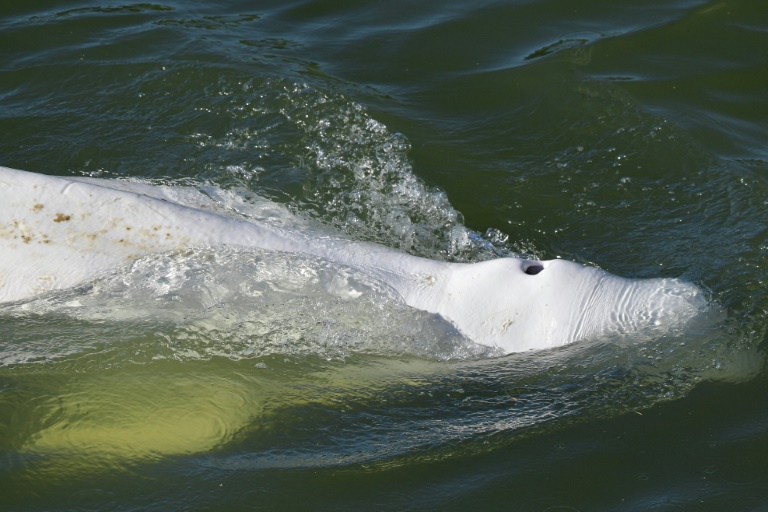Belugas are a protected species that cannot survive long in fresh water
French marine experts launched an ambitious operation Tuesday to rescue an ailing beluga whale that swam up the Seine river, to return it to the sea, an AFP journalist at the scene reported.
A group of 24 police and fire service divers held a final briefing before moving to the river to begin efforts to lift it out of the water and onto a truck for transportation.
The four-metre (13-foot) cetacean, a protected species usually found in cold Arctic waters, was spotted a week ago heading towards Paris, and is now some 130 kilometres inland.
“It’s a long rescue operation, very technical, which required many skills,” Isabelle Dorliat-Pouzet, secretary general of the Eure prefecture, told journalists earlier Tuesday.
It would involve around 80 people, including 40 firefighters and many police officers to secure the area, she added.
Divers and animal specialists including veterinarians would work to get the beluga into “a sort of hammock to suspend it above the water and bring it to a vehicle that will then transport it to the sea”.
As preparations for the operation got underway, people gathered along the banks of the river to observe their progress.
The animal’s movement inland has been blocked by a lock at Saint-Pierre-La-Garenne in Normandy, and its health has deteriorated after it refused to eat.
But its condition was “satisfactory”, Isabelle Brasseur of the Marineland sea animal park in southern France, Europe’s biggest, told AFP earlier on Tuesday.
Brasseur is part of a Marineland team sent to assist with the rescue, alongside the Sea Shepherd France NGO.
“What’s exceptional is that here the banks of the Seine are not accessible for vehicles… everything is going to have to be done by hand,” Brasseur said.
– ‘Have to get it out’ –
So far the beluga has not turned around, and experts have dismissed any attempt to “nudge” it back toward the Channel with boats, saying it would stress the weakened animal and likely prove futile.
The team will try to get the animal weighing 800 kilogrammes (nearly 1,800 pounds) onto a refrigerated truck.
“The truck will be refrigerated, at a temperature suited for the animal, humidity, a certain type of comfort, so there is no risk of asphyxiation,” Dorliat-Pouzet told journalists earlier.
There they hope to be able to treat it for several days before releasing into the open sea, the Eure authorities said.
“There it will, we hope, have a better chance of survival,” NGO Sea Shepherd France, which is assisting the operation, said on Tuesday.
It added that tranquilisation is not an option, since belugas are so-called “voluntary breathers” that need to be awake to inhale air.
“In any case, we have to get it out of there… and try to figure out what is wrong,” Brasseur said.
Veterinarians will keep constant watch during the move.
“There may be internal problems that we can’t see,” she said, despite the fact that belugas are “extremely hardy” as a species.
– Growing interest –
Interest in the beluga’s fate has spread far beyond France, generating a large influx of financial donations and other aid from conservation groups as well as individuals, officials said.
Sea Shepherd on Monday issued an appeal in particular for heavy-duty ropes, nets, mattresses and other equipment.
Belugas are normally found only in cold Arctic waters, and while they migrate south in the autumn to feed as ice forms, they rarely venture so far.
According to France’s Pelagis Observatory, specialised in sea mammals, the nearest beluga population is off the Svalbard archipelago, north of Norway, 3,000 kilometres (1,870 miles) from the Seine.
The trapped whale is only the second beluga ever sighted in France. The first was pulled out of the Loire estuary in a fisherman’s net in 1948.
burs-jj/gw









